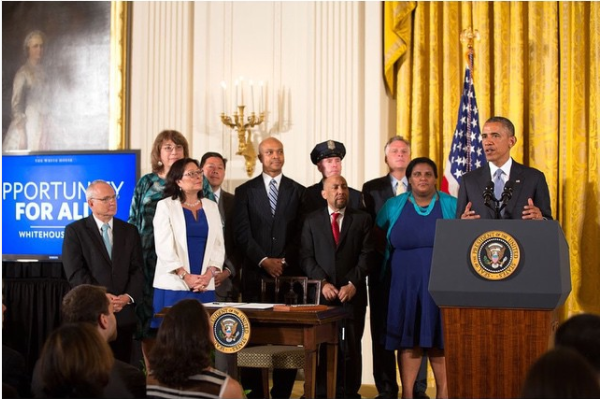Why Obama White House Officials Support Google's Firing of James Damore
By:
It was an honor of a lifetime for us to lead President Obama's White House Council on Women and Girls, knowing that the President took the goal of achieving gender equity for women as personally as we do.
 Obama White House Instagram Archive - instagram.com
Obama White House Instagram Archive - instagram.com
As mothers of daughters, we raised them to believe that with a strong work ethic and an even playing field, they can compete with anyone and succeed. The Council was designed to demonstrate to the American people and the world that it was a top priority of the Obama Administration to ensure every daughter was given an equal opportunity to compete.
We worked with employers to highlight the best practices that enable a culture of gender equity. One of these best practices is not tolerating sexism or biases in the workplace.
It is clear that this work is far from over. Indeed, a now-former Google engineer James Damore's anti-women manifesto demonstrates just how far we still have to go. His thoughts and actions shed light on a part of the fight for gender equality that is often overlooked or dismissed: sexist stereotypes and misogynist attitudes about women in the workplace. We stand with Google for their decision to take a stand against these disappointingly persistent and far too pervasive stereotypes and beliefs.
 Flickr - flickr.com
Flickr - flickr.com
The infamous memo primarily spent time outlining what the author sees as the biological differences between men and women – differences which he believes hold women back from tech jobs and leadership. As is often the case, sexism was dressed up with “evidence” in an effort to justify and normalize it. These kind of statements aren’t acceptable anywhere, least of all the workplace. When you publicly perpetuate misogynist stereotypes, women are demeaned and threatened, and a company’s culture is seriously undermined. How could any woman be managed by or work alongside a man who has literally told the world that she is biologically incapable of performing her job?
The narrative that this is about diversity of opinions and free speech is dead-wrong.
 Flickr - flickr.com
Flickr - flickr.com
This was someone who expressed discriminatory viewpoints about his workplace and his fellow co-workers, showing he views women as unfit to be his colleagues. We both have spent much of our careers in the private sector in male-dominated work environments. For decades, we have had to prove ourselves in ways that our male counterparts did not–all because of sexist stereotypes like the ones outlined in the memo.
The reality is that work cultures have often tolerated–or even encouraged–sexism. It has never been the norm for companies and individuals to call out sexism and demand better treatment of women, especially when sexism comes in subtle forms. Companies who take a stand against discrimination should be applauded and supported, which is why we stand with Google. Fighting to disprove sexist stereotypes is all-too-familiar to us, and we’re proud that Google has stepped up and told women that they’re not alone in that battle.
.jpg?auto=format&crop=faces&fit=crop&q=60&w=736&ixlib=js-1.1.0) Courtesy Rachel Palermo
Courtesy Rachel Palermo
The idea that women are biologically inferior and suited to different jobs than men has historically blocked women from getting positions they deserved, and it has limited our entry into entire industries and mobility across sectors. Assumptions like these will continue to hold women back unless our leaders, especially those in the corporate world, continue to take stands.
While some are trying to change the subject, we hope the focus of the debate prompted by this incident remains the real problem: barriers in the workplace, in our economy, and in our society that hold women and their families back. These barriers can be as insidious as that memo was explicit, and too many of them still exist in 2017.
We must all be responsible for challenging the barriers that lead to systemic inequity; shattering stereotypes and calling out sexism is a big part of that. That’s why we’ve spent our own careers shedding light on the obstacles women face and the steps we can take to remove them. Every person, company, and organization can take part in advocating for policies that support women, and they can take a stand against sexist attitudes that hold women back from economic equality. And we need our partners in cities, states, and the federal government to do the same. Google took a stand this time. Who’s next?
